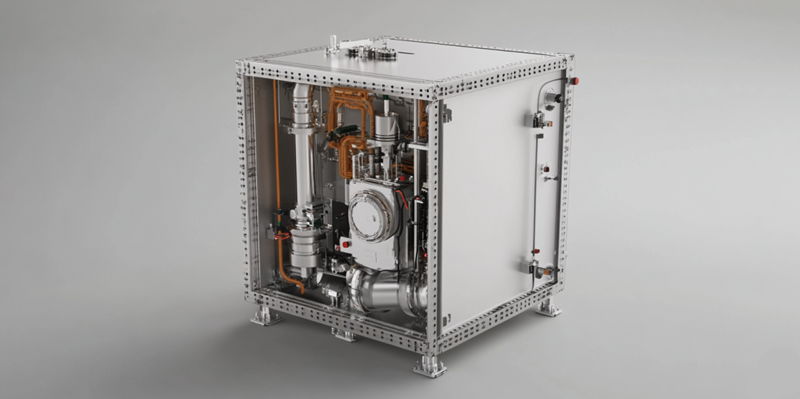As the demand for cloud services, cryptocurrency operations, and artificial intelligence applications continues to surge, data centers are facing growing energy bottlenecks that impede their growth potential. In response to this critical issue, Deep Atomic has introduced the MK60 small modular reactor (SMR), a compact and scalable solution designed specifically to power and cool data centers. Leveraging proven light water reactor technology, the MK60 is capable of generating 60 MWe of power and an additional 60 MW of cooling capacity, providing a sustainable, zero-carbon alternative to traditional energy sources for data centers. Founded in Zurich, Switzerland, Deep Atomic aims to alleviate energy constraints that can hinder the expansion of data centers, particularly in areas with limited grid access.
Addressing Energy Bottlenecks and Sustainability Challenges
Advanced Passive Safety Systems
The MK60’s innovative design incorporates advanced passive safety systems, making it an ideal choice for deployment near urban areas and locations with limited grid access. These safety systems ensure that the reactor operates safely and reliably, even in the event of an emergency, thus providing a robust solution to the energy challenges faced by data centers. By offering a dependable and efficient source of energy and cooling on-site, the MK60 allows data centers to bypass traditional grid limitations that often hamper their growth.
In addition to its safety features, the MK60’s ability to deliver sustainable, zero-carbon electricity aligns perfectly with the increasing emphasis on environmental responsibility and sustainability within the tech industry. Data centers, which are known for their high energy consumption, face growing pressure to reduce their carbon footprints and meet rigorous environmental standards. Deep Atomic’s CEO, William Theron, has emphasized the potential of the MK60 to transform the energy landscape for data centers by providing a solution that not only meets current energy demands but also supports long-term sustainability goals. The reactor’s zero-carbon footprint addresses the urgent need to combat climate change and adhere to stringent regulations.
Scalable Modular Deployment
Head of Engineering Freddy Mondale highlights the modular nature of the MK60 reactor, which drastically enhances its flexibility and scalability. This modular design allows data centers to start with a single unit and expand to multiple gigawatts of power as their energy demands increase. The ease with which the MK60 can be scaled makes it a future-proof solution that can adapt to the evolving needs of the rapidly growing data center industry. This adaptability ensures that data centers can continue to expand their operations without facing energy constraints that would otherwise limit their potential.
As data centers continue to proliferate, particularly with the rise of emerging technologies, the ability to seamlessly scale energy solutions becomes increasingly vital. The MK60’s modular approach offers a responsive and cost-effective means to meet escalating energy requirements efficiently. Whether accommodating the needs of a single, localized data center or supporting the operations of a large, multi-facility network, the MK60 provides a robust energy solution that can be tailored to diverse scenarios. The modularity of the MK60 also reduces the financial risks associated with large-scale energy projects, allowing for incremental investments that align with business growth.
Industry Collaboration and Investment in Nuclear Energy
Regulatory and Partnership Initiatives
Deep Atomic has already initiated discussions with regulators and potential partners as it seeks to bring the MK60 to market. By collaborating with data center operators and investors who are keen on building sustainable digital infrastructure, Deep Atomic aims to align with broader industry trends. Major tech companies such as Microsoft, Google, and Amazon have recently made significant investments in nuclear energy, underscoring a collective move to secure sustainable, long-term energy sources for their operations. This industry-wide shift highlights a growing consensus that advanced nuclear technologies are essential to support the digital infrastructure of the future.
Regulatory engagement is a crucial component of Deep Atomic’s strategy, as streamlined approval processes and robust safety assurances are necessary for widespread adoption of the MK60. Building strong partnerships with regulatory bodies ensures that the reactor meets all required safety and environmental standards, facilitating its deployment in various regions. Moreover, collaboration with tech giants looking to invest in sustainable energy solutions provides the financial and strategic support needed to scale the MK60’s implementation effectively. These partnerships are pivotal in fostering innovation and accelerating the transition to a more sustainable energy landscape.
Tech Giants and the Future of Sustainable Operations
The MK60’s innovative design includes cutting-edge passive safety systems, making it an excellent option for use near urban areas and spots with limited grid access. These systems ensure the reactor operates safely and reliably, even during emergencies, offering a robust solution to the energy and cooling challenges data centers face. By providing a dependable and efficient energy source on-site, the MK60 allows data centers to overcome traditional grid limitations that often hinder their growth.
Furthermore, the MK60’s capacity to deliver sustainable, zero-carbon electricity aligns perfectly with the growing focus on environmental responsibility and sustainability in the tech industry. Data centers, known for their high energy use, face increasing pressure to lower their carbon footprints and meet stringent environmental standards. Deep Atomic’s CEO, William Theron, highlights the potential of the MK60 to revolutionize energy for data centers, addressing both current energy demands and long-term sustainability goals. The reactor’s zero-carbon footprint directly combats climate change and helps meet rigorous regulatory requirements.

